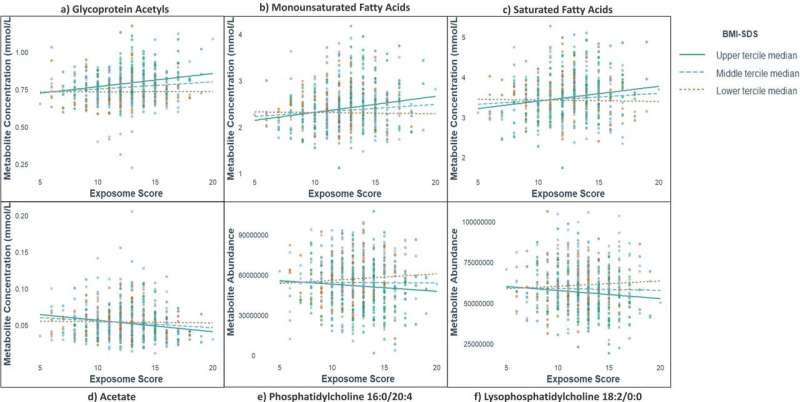This article has been reviewed according to Science X's editorial process and policies. Editors have highlighted the following attributes while ensuring the content's credibility:
fact-checked
peer-reviewed publication
trusted source
proofread
Children's exposome associated with changes in serum metabolites

The combined effect of environmental exposures and unhealthy lifestyle habits can affect children's cardiometabolic health in a way that exceeds their separate effects. A new study from the University of Eastern Finland shows the benefit of measuring the combined effect of multiple environmental and lifestyle factors.
An exposome score measuring a combination of environmental and lifestyle exposures was associated with a large number of serum metabolites linked to cardiometabolic health, with a number of these metabolites uniquely associated with the exposome score.
The study involved 504 children aged 6–9 years old who were followed up for eight years in the ongoing Physical Activity and Nutrition in Children (PANIC) Study in the city of Kuopio, Finland. The results were published in Communications Biology.
"To the best of our knowledge, this is the first longitudinal study to investigate the association between an exposome score and metabolic health across childhood and adolescence," says the first author of the study, Doctoral researcher Darren Healy.
The word "exposome" refers to environmental factors, including lifestyle, that people are exposed to throughout their life course. In the present study, part of the LongITools project, the exposome score comprised categories related to diet, physical activity, sleep, air pollution, and parental socioeconomic status.
Earlier research has shown that pathophysiological processes related to the development of cardiometabolic diseases can already commence in childhood. Serum metabolites, which are small compounds found in our body as a product of our metabolism, can reflect such early changes prior to the clinical onset of cardiometabolic diseases, and the advancement of metabolomics has allowed for increasingly accurate measurements of these metabolites.
In this study, a higher exposome score, indicating unhealthier environmental exposures and lifestyle habits, was associated with altered serum levels of 31 metabolites measured by liquid chromatography–mass spectrometry (LC–MS) and nuclear magnetic resonance (NMR) in childhood and adolescence.
These metabolites were predominantly phospholipids, fatty acids, amino acids, xenobiotics, and energy-related metabolites. In previous studies, some of these metabolites have been linked to the development of, for example, obesity, type 2 diabetes, or cardiovascular diseases in later life.
Importantly, 12 of the metabolites associated with the exposome score were not associated with any individual exposure category, highlighting the value of composite scores in predicting metabolic changes associated with adverse exposures.
The researchers also found that some of the associations between the exposome score and serum metabolites depended on the level of adiposity. For example, serum glycoprotein acetyls increased with a higher exposome score only in children with increased body fat content. Glycoprotein acetyls, which were measured by nuclear magnetic resonance in this study, are an inflammatory biomarker of early cardiovascular risk.
The children participating in the study were measured at baseline and at 2- and 8-year follow-ups. Diet was measured via 4-day food records. Sleep, physical activity, and sedentary time were assessed using wearable monitors. Parental socioeconomic status was assessed via questionnaires. Air pollution data was collected from measuring stations in Kuopio.
More information: Darren R. Healy et al, Longitudinal associations of an exposome score with serum metabolites from childhood to adolescence, Communications Biology (2024). DOI: 10.1038/s42003-024-06146-0





















